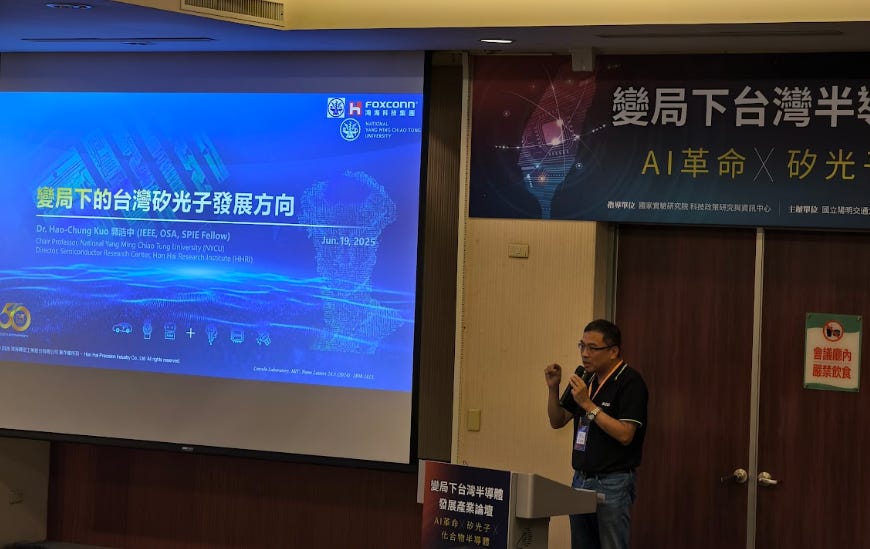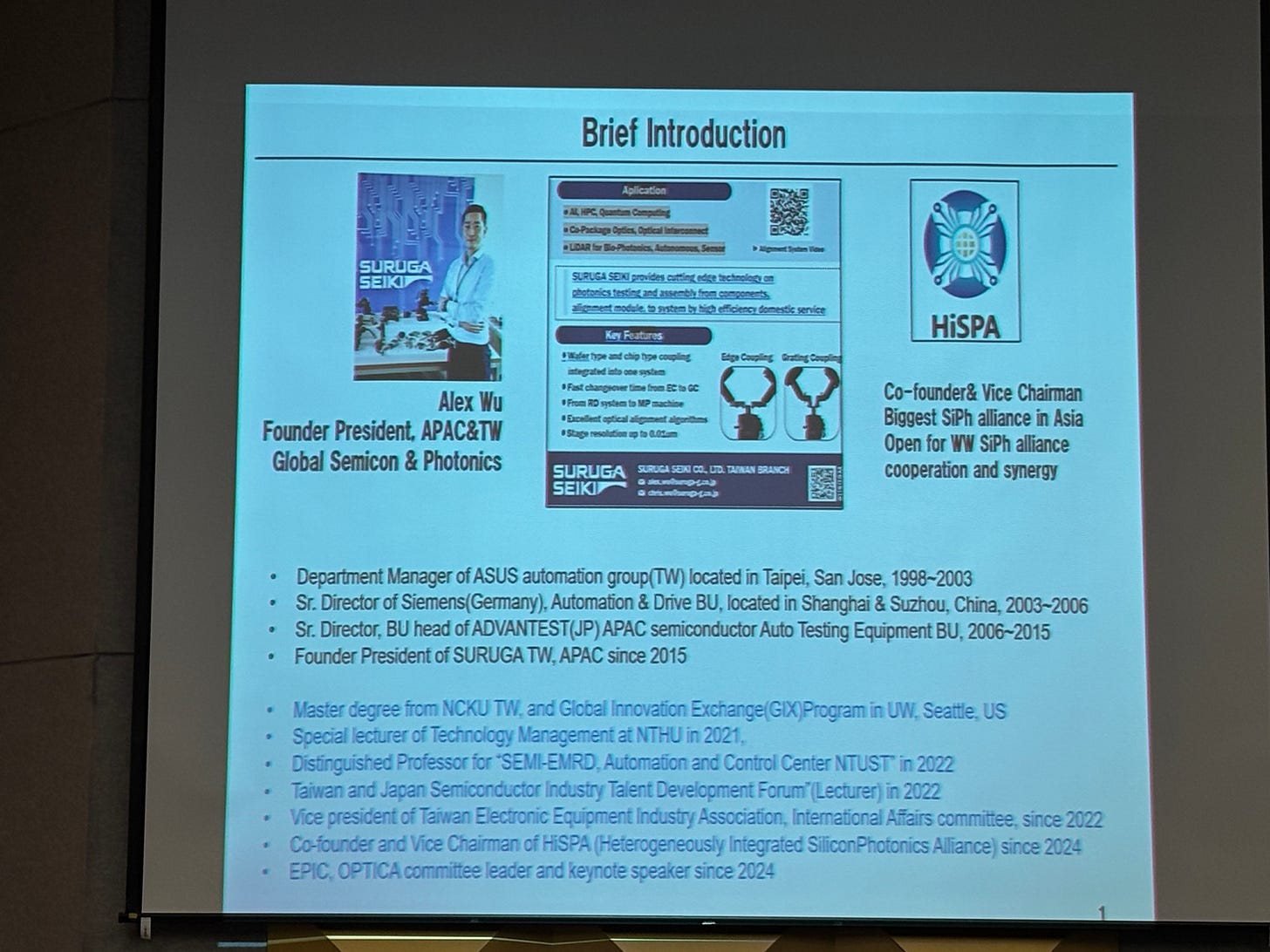Shaping the Future of Silicon Island: A Golden Symphony of Industry × Academia × Research × Government
Original Article by SemiVision Research(Foxconn, TIER ,GPM, ASE , USI , NYCU , Wins Semiconductor, Suruga SEIKI , RVI )
As emerging technologies such as generative AI, silicon photonics, and compound semiconductors sweep across the globe, Taiwan's semiconductor industry stands at the threshold of a critical new inflection point. In the face of intensifying international competition and shifting geopolitical dynamics, we must not only defend our manufacturing edge but also rethink our future value proposition.
From AI-driven advanced packaging to cutting-edge optoelectronic integration, only through the collective efforts of industry, academia, research institutions, and government can Taiwan transform from a “Silicon Island” into an “Intelligent Island.” This transformation will enable us to build an innovation ecosystem with system integration capability, design leadership, and global influence.
This forum brings together insights from leaders across advanced manufacturing, packaging and testing, equipment and materials, academia, and corporate innovation. From technology upgrades and anti-counterfeiting strategies to supply chain restructuring and cross-disciplinary talent cultivation, we collectively outline Taiwan’s strategic roadmap in the era of AI and next-generation semiconductors.
The semiconductor race over the next 20 years will no longer be just about process node scaling—it will be a comprehensive battle of national strength and industry-wide collaboration. And Taiwan is ready to once again redefine the world’s technological standards.
Special thanks to National Yang Ming Chiao Tung University for providing the venue and support for this industry forum.
Taiwan Institute of Economic Research (TIER)
The Taiwan Institute of Economic Research (TIER) has long been dedicated to research on national industrial policy, technological development trends, and digital transformation. The institute also houses specialized research centers focused on key sectors such as energy, ICT, and advanced manufacturing.
In this forum, TIER actively participates in the promotion of the “High-Power Device Application R&D Alliance,” highlighting the importance of strategic planning capabilities for emerging technologies and industrial value chains. Through cross-sector collaboration, TIER aims to support Taiwan’s industrial upgrading as the nation transitions into the era of AI and low-carbon innovation.。
Official Website: https://english.tier.org.tw/
High-Power Device Application R&D Alliance
Spearheaded by the Taiwan Institute of Economic Research (TIER), this alliance brings together industry, academia, and research sectors to integrate technical capabilities with application demands. It focuses on high-power application scenarios of third-generation semiconductors such as GaN and SiC—covering areas like electric vehicle charging systems, smart grids, and server power supplies.
The alliance’s mission is to establish a comprehensive platform encompassing materials, wafer processing, module packaging, and system-level applications, aiming to accelerate the technological deployment and commercialization of high-power devices in Taiwan.
Official Website: https://gan-sic-poster-competition.webnode.tw/
Foxconn Research Institute
The Foxconn Research Institute serves as the core innovation engine driving the Foxconn Technology Group’s transformation and upgrade. It focuses on disruptive technologies expected to shape the next 3 to 7 years, including semiconductor processes, AI computing, robotics systems, and electric vehicle platforms.
In the semiconductor domain, the institute adopts an application-driven approach—working backward from system-level needs to materials and processes. It emphasizes innovation across advanced packaging, thermal management, optoelectronic integration, and AI chip platforms, thereby strengthening Foxconn’s capabilities in next-generation data centers and smart manufacturing.
Dr. Hao-Chung Kuo
Director, Institute of Semiconductor Research
Dr. Hao-Chung Kuo is a leading expert in III-V compound semiconductors (such as GaAs, InP, GaN, etc.), with over 20 years of experience in optoelectronic device research and technology development. Since joining in 2004, he has focused on the development of high-efficiency optoelectronic devices, especially in enhancing carrier injection and light emission efficiency in GaN-based devices.
Dr. Kuo pioneered work on GaN vertical-cavity surface-emitting lasers (VCSELs), achieving the world’s first electrically pumped green GaN VCSEL. He has published extensively and received numerous international recognitions, including fellowships from OSA, IET, SPIE, IEEE, and IAAM between 2012 and 2021.
He has also served as Chair of IEEE Photonics Society Taipei Chapter, guest editor for IEEE JSTQE, and associate editor for the OSA/IEEE Journal of Lightwave Technology and OSA Photonics Research.
Research Focus:
III-V high-speed semiconductors (GaAs, InP, GaN, etc.)
Epitaxial growth and device technologies
MOCVD process development
GaN-based VCSELs and GaN LEDs
GaN HEMTs for high-power electronics
Nano-photonic and advanced optoelectronic materials
ASE Group – Advanced Packaging
ASE Group is the world’s largest provider of semiconductor packaging and testing services, and holds a leading position in advanced packaging technologies such as fan-out, 2.5D/3D IC integration, and silicon interposers. Driven by the rapid growth of AI and high-frequency, high-speed applications, ASE is actively developing packaging modules that integrate silicon photonics, while enhancing thermal management, power integrity, and high-speed data transmission. It serves as a key pillar of Taiwan’s national team in advanced packaging.
USI
USI, a subsidiary of ASE Group, is a leading provider of Electronic Design and Manufacturing Services (EDMS) with strong capabilities in system-in-package (SiP) design and high-density packaging manufacturing. The company places particular emphasis on the application of compound semiconductor modules in communications, automotive, and AI server markets. USI is actively developing highly integrated, miniaturized, and high-reliability packaging technologies, and is one of the few system-level companies in Taiwan with coordinated front-end and back-end development capabilities.
Win Semiconductors Corp.
Win Semiconductors is the world’s largest pure-play foundry specializing in gallium arsenide (GaAs) compound semiconductors. Its services cover a wide range of applications, including 5G power amplifiers (PAs), satellite communications, automotive radar, and optoelectronic sensing. In response to the growing demand for high-bandwidth communication in the AI era, the company provides high-performance RF components and optoelectronic integration platforms for optical communication. Win plays a critical midstream role in the compound semiconductor supply chain.
Suruga Seiki Taiwan
Suruga Seiki is a global leader in precision machinery and optoelectronic equipment, specializing in sub-micron alignment platforms and key components such as active and passive optical coupling modules. With the high-precision demands of silicon photonics and co-packaged optics (CPO) packaging, Suruga provides module-level alignment systems, automated assembly, and testing platforms—supporting the industry's move toward high-density optoelectronic heterogeneous integration.
Alex Wu
Founder and President, APAC & TW – Global Semiconductor & Photonics, Suruga Seiki
Co-founder & Vice Chairman, HiSPA (Heterogeneously Integrated Silicon Photonics Alliance)
Alex Wu is a seasoned leader in the semiconductor and photonics sectors, with extensive experience spanning automation, testing, and SiPh system integration. He currently serves as the Founder and President of Suruga Seiki’s APAC branch since 2015, driving high-precision alignment, optical coupling, and photonic module solutions for advanced packaging and SiPh applications.
Career Highlights:
Former Department Manager at ASUS Automation Group (Taiwan), with postings in Taipei and San Jose (1998–2003)
Senior Director at Siemens (Germany), Automation & Drive BU, based in Shanghai and Suzhou (2003–2006)
Senior Director, Business Unit Head at Advantest (Japan), overseeing the APAC semiconductor auto testing equipment division (2006–2015)
Academic and Industry Engagements:
Holds a Master’s degree from National Cheng Kung University (Taiwan) and participated in the Global Innovation Exchange (GIX) Program at the University of Washington, Seattle
Distinguished Professor for SEMI-EMRD and NTUST (Automation & Control Center, 2022)
Lecturer for Taiwan–Japan Semiconductor Talent Development Forums (since 2022)
Vice President of the Taiwan Electronic Equipment Industry Association (International Affairs Committee, since 2022)
Co-founder and Vice Chairman of HiSPA, Asia’s largest silicon photonics alliance, promoting global cooperation in SiPh integration
Keynote speaker at EPIC, OPTICA, and other international platforms (since 2024)
Alex Wu is a key figure driving Asia’s momentum in heterogeneously integrated photonic systems and next-generation semiconductor packaging.
GPM Group
Gallant Precision Machining is a Taiwan-based manufacturer specializing in high-precision equipment for advanced semiconductor packaging and optoelectronic process automation. The company has established a strong technological edge in wafer-level packaging, laser alignment, and optical testing equipment. Following the pandemic, GPM strategically refocused its market efforts back to Taiwan, actively collaborating with TSMC’s ecosystem and key industry associations to enhance domestic equipment self-sufficiency and localization capabilities.
National Yang Ming Chiao Tung University – Optoelectronics Program
As one of Taiwan’s premier science and engineering universities, NYCU has a strong foundation and international reputation in optoelectronic research. Its optoelectronics program trains talent with core expertise in photonic materials, quantum optics, silicon photonics, and high-speed communication system design. The program also actively engages in industry-academia collaboration, serving as a cross-disciplinary innovation platform and an essential academic force in Taiwan’s AI–optoelectronics integration era.
Science & Technology Policy Research and Information Center (STPI), National Applied Research Laboratories (NARLabs)
STPI, under NARLabs, is a key national think tank for science and technology policy, technological foresight, and industrial planning. It plays a strategic role in analyzing trends and supporting policymaking in critical domains such as semiconductors, AI, quantum technology, cybersecurity, and materials science.
In this forum on “Semiconductor Strategies Amid Global Disruptions,” STPI serves as a vital bridge between government policymaking and industry implementation. The center contributes to policy integration, international competitive analysis, and offers recommendations to strengthen domestic supply chains and encourage indigenous innovation in critical technologies. STPI also leads initiatives like the development of national science and technology indicators and the integration of cross-agency S&T data platforms, making it a driving force in shaping Taiwan’s innovation policy and industrial governance.
For Paid Members | SemiVision In-Depth Insights: Roundtable Discussions and Expert Perspectives
As exclusive content for SemiVision paid members, we will be providing in-depth analysis of recent roundtable discussions and Q&A sessions. Our team will systematically organize and expand upon each speaker’s technical insights and industry observations, contextualizing them within broader market trends and technology roadmaps.
This installment begins with a focus on Professor Hao-Chung Kuo of the Foxconn Research Institute, who offers critical perspectives on the convergence of Artificial Intelligence (AI) and Silicon Photonics. With a background bridging academia and industry, Professor Kuo addresses the evolution of system architecture, technological implementation, and supply chain collaboration—highlighting Taiwan’s strategic role in building the next generation of AI computing infrastructure.
In the coming issues, SemiVision will continue to deliver structured analyses of each expert’s contributions, offering members a comprehensive view of the evolving industry landscape and emerging technological frontiers.
At the conference venue, a Taiwanese innovative company, Rayleigh Vision Intelligence (RVI), made a notable debut at NVIDIA’s GPU Technology Conference (GTC 2025) by unveiling the world’s first AI-driven Micro LED intelligent manufacturing technology, named AI MioC. This breakthrough not only enhances production efficiency and reduces manufacturing costs, but also addresses the long-standing mass production bottlenecks in the Micro LED industry.






















